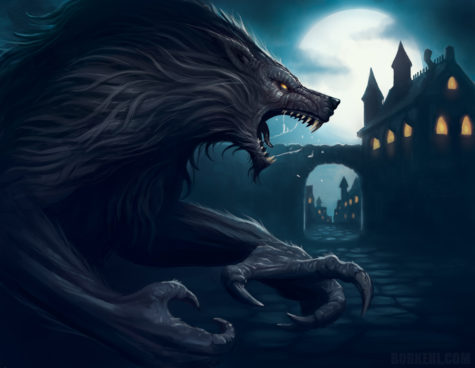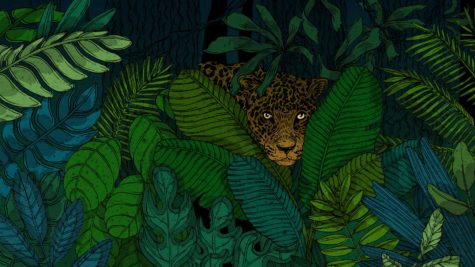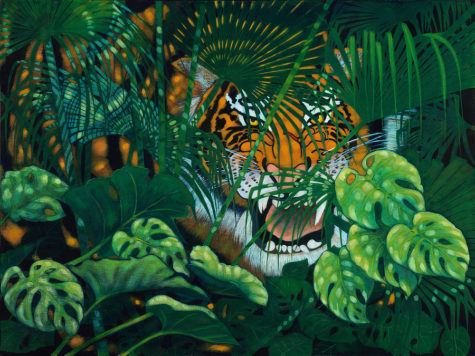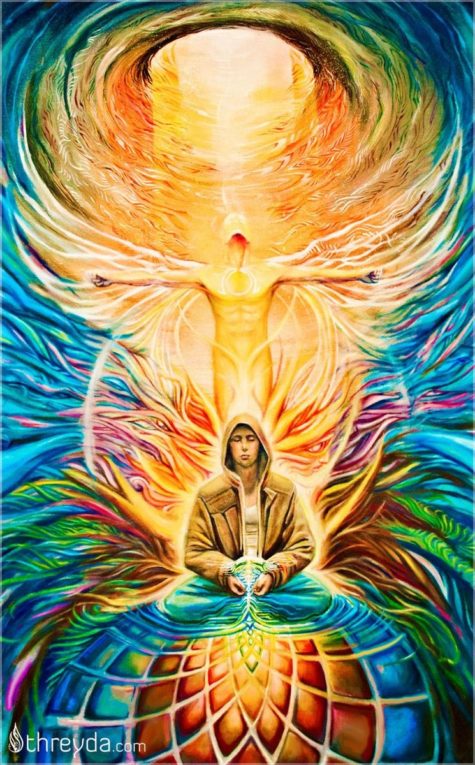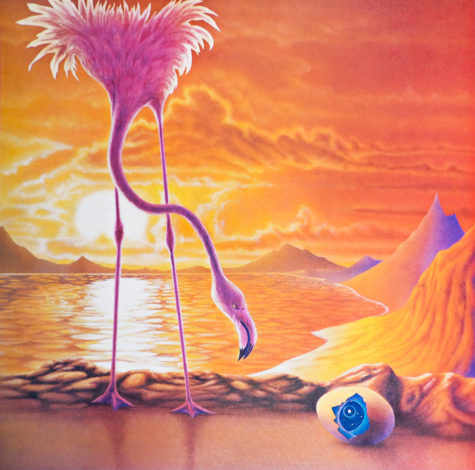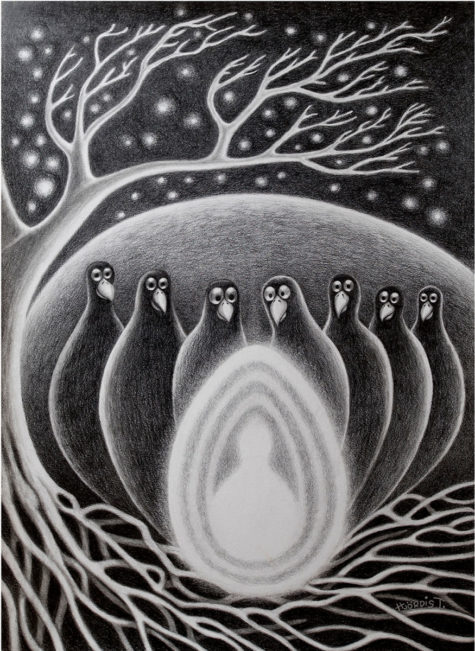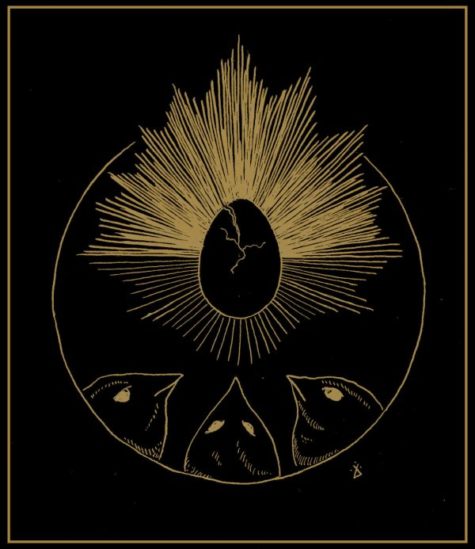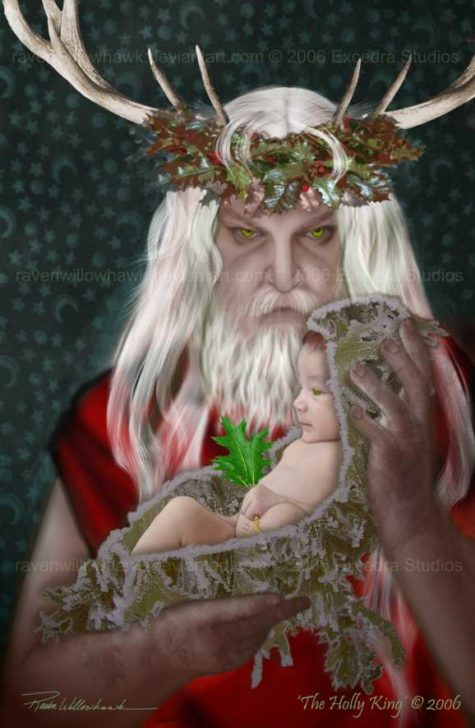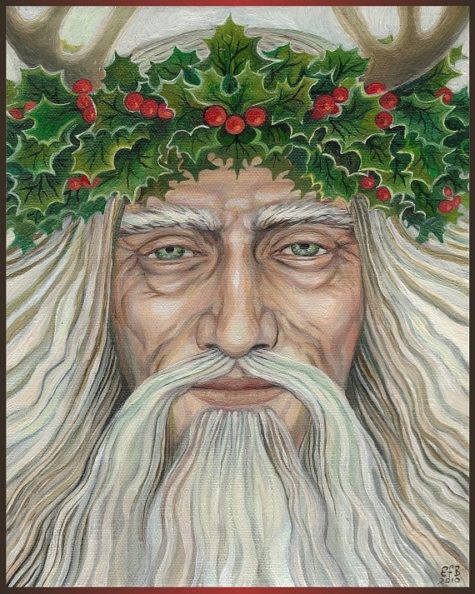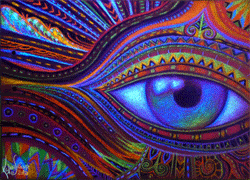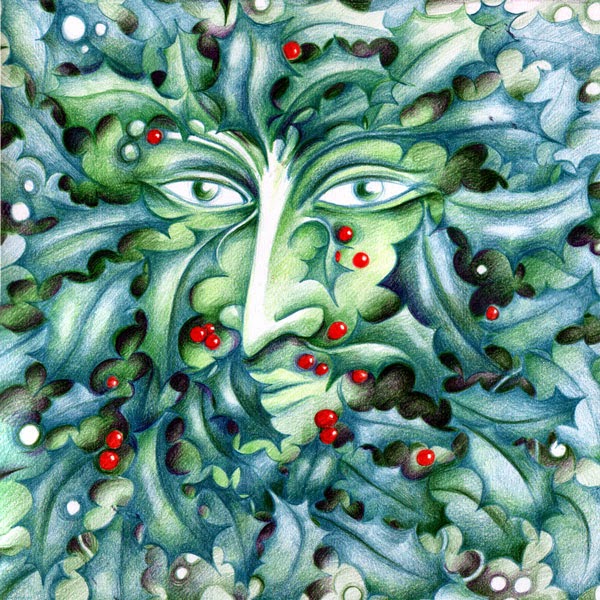An Encounter With A Werewolf
From the book Werwolves, by Elliott O’Donnell, first published in 1912, we have this account of a lupine phantasm representing the personality of the werewolf which occurred in Estonia, on the shores of the Baltic.
A gentleman and his sister, whom I will call Stanislaus and Anno D’Adhemar, were invited to spend a few weeks with their old friends, the Baron and Baroness Von A—, at their country home in Estonia. On the day arranged, they set out for their friends’ house, and alighting at a little station, within twenty miles of their destination, were met by the Baron’s droshky.
It was one of those exquisite evenings – a night light without moon, a day shady without clouds – peculiar to that clime. Indeed, it seemed as if the last glow of the evening and the first grey of the morning had melted together, and as if all the luminaries of the sky merely rested their beams without withdrawing them.
To Stanislaus and Anno, jaded with the wear and tear of life in a big city, the calm and quiet of the country-side was most refreshing, and they heaved great sighs of contentment as they leaned far back amid the luxurious upholstery of the carriage, and drew in deep breaths of the smokeless, pure, scented air. Their surroundings modelled their thoughts. Instead of discussing monetary matters, which had so long been uppermost in their minds, they discoursed on the wonderful economy of happiness in a world full of toil and struggle; the fewer the joys, they argued, the higher the enjoyment, till the last and highest joy of all, true peace of mind, i.e., content, was the one joy found to contain every other joy.
Occasionally they paused to remark on the brilliant lustre of the stars, and, not infrequently, alluded to the Creator’s graciousness in allowing them to behold such beauty. Occasionally, too, they would break off in the midst of their conversation to listen to the plaintive utterings of some night bird or the shrill cry of a startled hare.
The rate at which they were progressing – for the horses were young and fresh – speedily brought them to an end of the open country, and they found themselves suddenly immersed in the deepening gloom of a dense and extensive forest of pines. The track now was not quite so smooth; here and there were big ruts, and Stanislaus and his sister were subjected to such a vigorous bumping that they had to hold on to the sides of the droshky, and to one another.
In the altered conditions of their travel, conversation was well-nigh impossible. The little they attempted was unceremoniously jerked out of them, and the nature of it – I am loath to admit – had somewhat deteriorated. It had, in fact, in accordance with their surroundings, undergone a considerable change.
“What a vile road!” Stanislaus exclaimed, clutching the side of the droshky with both hands to save himself from being precipitated into space.
“Yes – isn’t – it?” gasped Anno, as she lunged forward, and in a vain attempt to regain her seat fell on their handbag, which gave an ominous squish. “I declare there – there – will be – nothing left of me – by the – by the time we get there. Oh dear! Whatever shall I do? Wherever have you got to, Stanislaus?”
The upper half of Stanislaus was nowhere to be seen! His lower half, however, was discovered by his sister convulsively pressed against the side of the droshky. In another moment this, too, would undoubtedly have disappeared, and the lower extremities would have gone in pursuit of the upper, had not Anno with admirable presence of mind effected a rescue. She tugged at her brother’s coat-tails in the very nick of time, with the result that his whole body once again hove into view.
Just then a bird sang its final song before retiring for the night, and Stanislaus, hot and trembling all over, shouted out: “What a hideous noise! I declare it quite frightened me”; whilst Anno shuddered and put her fingers in her ears. They once more abused the road; then the trees.
“Great ugly things,” they said; “they shut out all the light.”
And then they abused the driver for not looking out where he was going, and finally they began to abuse one another. Anno abused Stanislaus, because he had disarranged her hat and hair, and Stanislaus, Anno, because he couldn’t hear all she said, and because what he did hear was silly. Then the Stygian darkness of the great pines grew; and the silence of wonder fell on the two quarrellers.
On, on, on rolled the droshky, a monotonous rumble, rumble, that sounded very loud amid the intense hush that had suddenly fallen on the forest. Stanislaus and Anno grew drowsy; the cold night air, crowning their exertions of the day, induced sleep, and they were soon very much in the land of nods: Stanislaus with his head thrust back as far as it would go, and Anno with her head leaning slightly forward and her chin deeply rooted in the silvery recesses of her rich fur coat.
The driver stopped for a moment. He had to attend to his lights, which, he reflected, were behaving in rather an odd manner. Then, scratching his head thoughtfully, he cracked his whip and drove hurriedly on. Once again, rumble, rumble, rumble; and no other sounds but far away echoes and the gentle cooing of a soft night breeze through the forked and ragged branches of the sad and stately pines. On, on, on, the light uncertain and the horses brisk.
Suddenly the driver hears something – he strains his ears to catch the meaning of the sounds – a peculiar, quick patter, patter – coming from far away in the droshky’s wake. There is something – he can’t exactly tell what – in those sounds he doesn’t like; they are human, and yet not human; they may proceed from some one running – some one tall and lithe, with an unusually long stride. They may – and he casts a shuddering look over his shoulder as the thought strikes him – they may be nothing human – they may be the patter of a wolf! A huge, gaunt, hungry wolf! an abnormally big wolf! a wolf with a gallop like that of a horse!
The driver was new to these parts; he had but lately come from the Baron’s establishment in St. Petersburg. He had never been in this wood after dark, and he had never seen a wolf save in the Zoological Gardens. The atmosphere now began to sharpen. From being merely cold it became positively icy, and muttering, “I never felt anything like this in St. Petersburg,” the driver shrank into the depths of his furs, and tried to settle himself more comfortably in his seat.
The horses, too, four in number, were strangers in Estonia, the Baron having only recently paid a heavy price for them in Nava on account of their beauty. Not that they were merely handsome; despite their small and graceful build, and the glossy sleekness of their coats, they were both strong and spirited, and could cover twenty-five versts without a pause. But now they, too, heard the sounds – there was no doubt of that – and felt the cold.
At first they shivered, then whined, and then came to an abrupt halt; and then, without the slightest warning, tore the shifting tag and rag tight around them, and bounding forward, were off like the wind. Then, away in their rear, and plainly audible above the thunder of their hoofs, came a moaning, snarling, drawn-out cry, which was almost instantly repeated, not once, but again and again.
Stanislaus and Anno, who had been rudely awakened from their slumbers by the unusual behaviour of the horses, were now on the qui vive.
“Good heavens! What’s that?” they cried in chorus.
“What’s that, coachman?” shrieked Anno, digging the shivering driver in the back.
“Volki, mistress, volki!” was the reply, and on flew the droshky faster, faster, faster!
To Stanislaus and Anno the word “wolves” came as a stunning shock. All the tales they had ever heard of these ferocious beasts crowded their minds at once. Wolves! was it possible that those dreadful bogies of their childhood – those grim and awful creatures, grotesquely but none the less vividly portrayed in their imagination by horror-loving nurses – were actually close at hand! Supposing the brutes caught them, who would be eaten first? Anno, Stanislaus, or the driver? Would they devour them with their clothes on? If not, how would they get them off?
Then, filled with morbid curiosity, they strained their ears and listened. Again – this time nearer, much nearer – came that cry, dismal, protracted, nerve-racking. Nor was that all, for they could now discern the pat-pat, pat-pat of footsteps – long, soft, loping footsteps, as of huge furry paws or naked human feet. However, they could see nothing – nothing but blackness, intensified by the feeble flickering of the droshky’s lanterns.
“Faster! drive faster!” Anno shouted, turning round and poking the coachman in the ribs with her umbrella. “Do you want us all to be eaten?”
“I can’t mistress, I can’t!” the man expostulated; “the horses are outstripping the wind as it is. They can’t go quicker.” And the driver, consigning Stanislaus and his sister to the innermost recesses of hell, prayed to the Virgin to save him.
Nearer and nearer drew the steps, and again a cry – a cry close behind them, perhaps fifty yards – fifty yards at the most. And as they were trying to locate it there burst into view a gigantic figure – nude and luminous, a figure that glowed like a glow-worm and bent slightly forward as it ran. It covered the ground with long, easy, swinging strides, without any apparent effort.
In general form its body was like that of a man, saving that the limbs were longer and covered with short hair, and the feet and hands, besides being larger as a whole, had longer toes and fingers. Its head was partly human, partly lupine – the skull, ears, teeth, and eyes were those of a wolf, whilst the remaining features were those of a man. Its complexion was devoid of colour, startlingly white; its eyes green and lurid, its expression hellish.
Stanislaus and Anno did not know what to make of it. Was it some terrible monstrosity that had escaped from a show, or something that was peculiar to the forest itself, something generated by the giant trees and dark, silent road? In their sublime terror they shrieked aloud, beat the air with their hands to ward it off, and finally left their seats to cling on to the back of the driver’s box.
But it came nearer, nearer, and nearer, until they were almost within reach of its arms. They read death in the glinting greenness of its eyes and in the flashing of its long bared teeth. The climax of their agony, they argued, could no longer be postponed. The thing had only to make a grab at them and they would die of horror – die even before it touched them. But this was not to be.
They were still staring into the pale malevolent face drawing nearer and nearer, and wondering when the long twitching fingers would catch them by the throats, when the droshky with a mad swirl forward cleared the forest, and they found themselves gazing wildly into empty moonlit space, with no sign of their pursuer anywhere.
An hour later they narrated their adventure to the Baron. Nothing could have exceeded his distress. “My dear friends!” he said, “I owe you a profound apology. I ought to have told my man to choose any other road rather than that through the forest, which is well known to be haunted. According to rumour, a werwolf – we have good reason to believe in werwolves here – was killed there many years ago.”
Jaguar Vengence
From the book Werwolves, by Elliott O’Donnell, first published in 1912, we have this account:
A Dutch trader, of the name of Van Hielen, was visiting for purely business purposes an Indian settlement in a very remote part of the colony. Roaming about the village one evening, he came to a hut standing alone on the outskirts of one of those dense forests that are so characteristic of Arawak.
Van Hielen paused, and was marvelling how anyone could choose to live in so outlandish and lonely a spot, when a shrill scream, followed by a series of violent guttural ejaculations, came from the interior of the building, and the next moment a little boy – some seven or eight years of age – rushed out of the house, pursued by a prodigiously fat woman, who whacked him soundly across the shoulders with a knotted club and then halted for want of breath.
Van Hielen, who was well versed in the native language, politely asked her what the boy had done to deserve so severe a chastisement.
“Done!” the woman replied, opening her beady little eyes to their full extent; “why, he’s not done anything – that’s why I beat him – he’s incorrigibly idle. He and his sister spend all their time amid the trees yonder conversing with the bad spirits. They learned that trick from Guska, with the evil eye. She has bewitched them. She was shot to death with arrows in the market-place last year, and my only regret is that she wasn’t put out of the way ten years sooner. Ah! there’s that wicked girl Yarakna – she’s been hiding from me all the day. I must punish her, too!”
And before Van Hielen could speak the indignant parent waddled off – with surprising swiftness for one of her vast proportions – and reappeared dragging by the wrist an elfish-looking girl of about ten. She gave the urchin one blow, and was about to give her another, when Van Hielen, whose heart was particularly tender where children were concerned, interfered, and by dint of bribery persuaded her to desist. She retired indoors, and Van Hielen found himself alone with the child.
“May the spirit of the woods for ever be your friend!” the maiden said. “But for you my poor back would have been beaten to a tonka bean. My brother and I have suffered enough at the hands of the old woman – we’ll suffer no more.”
“What will you do then?” Van Hielen asked, shocked at the revengeful expression that marred the otherwise pretty features of the child. “Remember, she is your mother, and has every right to expect you to be obedient and industrious.”
“She is not our mother!” the girl answered. “Our mother is the spirit of the woods. We work for her – not for this old woman, and in return she tells us tales and amuses us.”
“You work for her!” Van Hielen said in amazement. “What do you mean?”
The child smiled – the ignorance of the white man tickled her. “We gather aloes for medicine for her sick children; the core of the lechugilla for their food, yucca leaves for plumes for their heads, and scarlet panicles of the Fouquiera splendens for their clothes. My brother and I will go to her to-night when the old woman is sleeping. Where? Ah! we do not tell anyone that. Do we see her? The spirit of the woods, you mean? Yes, we see her, but it is not every one who can see her–only those who have sight like ours. But I must go now–my brother is calling me.”
Van Hielen could hear nothing; though he did not doubt, from the child’s behaviour, that she had been called. She ran merrily away, and he watched her black head disappear in the thick undergrowth facing him. Van Hielen’s curiosity was roused. What the child had said impressed him deeply; and against his saner judgment he resolved to secrete himself near the hut and watch.
After it had been dusk some time, and all sounds had ceased, he saw the two children emerge from the hut, and, tiptoeing softly towards the trees, fall on their hands and knees and crawl along a tiny, deviating path. Hardly knowing what he was doing, but impelled by a force he could not resist, Van Hielen followed them.
It was a delicious night–at that time of year every night in Arawak is delicious–and Van Hielen, who was very simple in his love of nature, imbibed delight through every pore in his body. As he trod gently along, pushing first this branch and then that out of the way, and stooping down to half his height to creep under a formidable bramble, countless voices from animal land fell on his ears.
From a glimmering patch of water, away on his left, came the trump of a bull-frog and the wail of the whip-poor-will; a monkey chattered, a parrot screeched, whilst a shrill cry of terror, accompanied by a savage growl, plainly told of the surprise and slaughter of some defenseless animal by one of the many big beasts of prey that made every tree their lurking place.
On any other occasion Van Hielen would have thought twice before embarking on such an expedition; but that night he seemed to be labouring under some charm which had lulled to sleep all sense of insecurity. It was true he was armed, but of what avail is a rifle against the unexpected spring of a jaguar or leopard–from a bough some ten or twenty feet directly over one’s head–or the sudden lunge of a boa constrictor!
At first, the path wound its way through a dense chapparal consisting of the various shrubs and plants rarely to be met with in other parts of Arawak, namely, acacias, aloes, lechuguillas, and the Fouquiera splendens. But after a short time this kind of vegetation was succeeded by something far more imposing – by dense masses of trees, many of them at the least one hundred and fifty feet in height: the mora, which from a distance appears like a hillock clothed with the brightest vegetation; the ayucari, or red cedar; and the cuamara, laden with tonka beans. So thick was their foliage overhead that one by one Van Hielen watched the stars disappear; and the path ahead of him darkened till it was as much as he could do to grope along.
Still he was not afraid. The thought of that elfish little maiden with the luminous eyes crawling along in front of him inspired him with extraordinary confidence and he plunged on, anxious only to catch another glimpse of her and see the play out. Once his progress was interrupted by something hot and leathery, that pushed him nearly off his feet and puffed rudely in his face.
It was on the tip of his tongue to give vent to his ruffled feelings in forcible language, but the knowledge that this would assuredly warn the children of his proximity kept him quiet, and he contented himself with striking a vigorous blow. There was a loud snort, a crashing and breaking of brushwood, and the thing, whatever it was, rushed away.
Another time he stumbled over a snake which was gliding from one side of the path to the other. The creature hissed, and Van Hielen, giving himself up for lost, jumped for all he was worth. As luck would have it the snake missed, and Van Hielen, escaping with nothing more serious than a few scratches and a bump or two, was able to continue his course.
After long gropings the path at length came to an end, the trees cleared, and Van Hielen saw before him a pool, radiantly illuminated by the moon, and in the very centre – an immense Victoria Regia water-lily.
Though accustomed to the fine species of this plant in Guiana – which is the home of the Victoria Regia – Van Hielen was doubtful if he had ever before beheld such a magnificent specimen. The silvery moonlight, falling on its white and pink petals, threw into relief all the exquisite delicacy of their composition, and gave to them a glow which could only have been rivalled in Elysium.
Indeed, the whole scene, enhanced by the glamour of the hour and the sweet scent of plants and flowers, was so reminiscent of fairyland that Van Hielen – enraptured beyond description – stood and gazed in open-mouthed ecstasy.
Then his eyes fell on the children and he noiselessly slipped back under cover of a tree.
Hand in hand the boy and girl advanced to the water’s edge, and kneeling, commenced to recite some strange incantation, which Van Hielen tried in vain to interpret. Sometimes their voices reached a high, plaintive key; sometimes they sank to a low murmur, strangely musical, and strangely suggestive of the babbling of brook water over stones and pebbles.
When they had finished their incantation, they got up, and running to some bushes, returned in a few seconds with their arms full of flowers, which they threw with great dexterity on to the leaves of the giant lily. With their faces still turned to the water they remained standing, side by side, whilst a silence–deep and impressive, and shared, so it appeared to Van Hielen, by all nature–fell upon them.
A cold current of air, rising apparently from the pool, blew across the opening, and sweeping past Van Hielen, set all the leaves in motion. It rustled on till its echoes gradually ceased, and all was still again. It now seemed to Van Hielen that the character of everything around underwent a subtle change; and the feeling that every object around him was indulging in a hearty laugh at his expense intensified with every breath he drew.
For the first time Van Hielen was afraid. He could not define the cause of his fear–but that only made his fear the more acute. He was frightened of the wind and darkness, and of something more than the wind and darkness–something concealed in–something cloaked by the wind and darkness. Even the atmosphere had altered–it, too, was making game of him. It distorted his vision. The things he saw around him were no longer stationary–they moved. They twirled and twisted themselves into all sorts of grotesque and fanciful attitudes; grew large, then small; nearer and then more distant.
The plot of ground in front of which the children knelt played all manner of pranks – pranks Van Hielen did not at all like. It moved round and round – faster and faster, until it eventually became a whirlpool; which suddenly reversed and assumed the appearance of a pyramid revolving on its apex. Quicker and quicker it spun round–closer and closer it drew; until, without warning, it suddenly stopped and disappeared; whilst its place was taken by an oddly shaped bulge in the ground, which, swaying backward and forward, increased and increased in stature, till it attained the height of some seven or eight feet.
Van Hielen could not compare this with anything he had ever seen. It was monstrous but shapeless – a mere mass of irregular lumps, a dull leadish white, and vibrating horribly in the moonlight. He thought of the children; but where they had stood he saw only two greenish-yellow spheres that, twirling round and round, suddenly approached him.
As he started back to escape them, all was again changed. The lumpy figure had vanished, the atmosphere cleared, and everything was absolutely normal. There were now, however, solid grounds for fear. Advancing on him with flashing eyes and scintillating teeth were two vividly marked jaguars–a male and female. Van Hielen, usually calm and collected in the face of danger, on this occasion lost his presence of mind: his gun dropped from his hands, his knees quivered, and, helpless and inert, he reeled against the tree under which he had been standing.
The jaguars – which seemed to be unusually savage even for jaguars – prepared to spring, and Van Hielen, certain his hour had come, was about to close his eyes and resign himself to his fate, when the female brute, although the bigger and more formidable, hesitated – thrust its dark, handsomely spotted head almost in its victim’s face, and then, lashing its companion sharply with its tail, swerved aside and was off like a dart.
It took Van Hielen some minutes to realize his escape, and then, more in a dream than awake, he mechanically shouldered his rifle and slowly followed in the beasts’ wake.
An hour’s walking brought him to the end of the forest. The dawn was breaking, and the track leading to the settlement was just beginning to exhibit the mellowing influence of the first rays of the sun. There was an exhilarating freshness in the air that made Van Hielen keenly sensitive to the ambitious demands of a newly awakened stomach.
Opposite him was the hut of the old woman, the entrance somewhat clumsily blocked with a makeshift door. As Van Hielen looked at it curiously, wondering if the woman was in the habit of barricading it in this fashion on account of her proximity to the forest, sounds greeted him from within.
Stepping lightly up to the hut, Van Hielen listened attentively. Some big animal – a hound most probably – was gnawing a bone – crunch, crunch, crunch!
Van Hielen moved away, but hadn’t gone very far before an indefinable something made him turn back. That crunching, was it a dog or was it …?
His heart turned sick within him at the bare thought. Again he listened at the threshold, and again he heard the sounds – gnaw, gnaw, gnaw – crunch, crunch, crunch! He rapped at first gently, and then loudly, ever so loudly.
The gnawing at once stopped, but no one answered him. Then he called – once, twice, thrice: there was no reply. Assured now there was something amiss, he gripped his rifle, and putting his shoulder to the door, burst it open. A flood of daylight rushed in, and he saw before him on the floor the mutilated and half-eaten remains of a woman, and – did his eyes deceive him or did he see? Crouching in a corner all ready to spring, two magnificent jaguars. Van Hielen raised his rifle, but – in less than a second – it fell from his grasp.
Towards him, from the same spot – their small mouths and slender hands smeared with blood – ran Yarakna and her brother.
An Account Of A Weretiger
From the book Werwolves, by Elliott O’Donnell, first published in 1912, we have this account from an eye witness to a Weretiger transformation somewhere in the Jungles of India:
“Anxious to see if there was anything of truth in the alleged materialization of the tiger totem to those supplicating it, I went one evening to a spot in the jungle–some two or three miles from the village–where I had been informed the manifestations took place.
As the jungle was universally held to be haunted I met no one; and in spite of my dread of the snakes, big cats, wild boars, scorpions, and other poisonous vermin with which the place was swarming, arrived without mishap at the place that had been so carefully described to me–a circular clearing of about twenty feet in diameter, surrounded on all sides by rank grass of a prodigious height, trolsee shrubs, kulpa and tamarind-trees. Quickly concealing myself, I waited the coming of the would-be tiger-man.
“He was hardly more than a boy – slim and almost feminine – and came gallivanting along the narrow path through the brushwood, like some careless, high-spirited, brown-skinned hoyden.
“The moment he reached the edge of the mystic circle, however, his behaviour changed; the light of laughter died from his eyes, his lips straightened, his limbs stiffened, and his whole demeanour became one of respect and humility.
“Advancing with bare head and feet some three or so feet into the clearing, he knelt down, and, touching the ground three times in succession with his forehead, looked up at a giant kulpa-tree opposite him, chanting as he did so some weird and monotonous refrain, the meaning of which was unintelligible to me.
Up to then it had been light–the sky, like all Indian skies at that season, one blaze of moonbeams and stars; but now it gradually grew dark. An unnatural, awe-inspiring shade seemed to swoop down from the far distant mountains and to hush into breathless silence everything it touched. Not a bird sang, not an insect ticked, not a leaf stirred. One might have said all nature slept, had it not been for an uncomfortable sensation that the silence was but the silence of intense expectation–merely the prelude to some unpleasant revelation that was to follow.
At this juncture my feelings were certainly novel–entirely different from any I had hitherto experienced.
” I had not believed in the supernatural, and had had absolutely no apprehensions of coming across anything of a ghostly character – all my fears had been of malicious natives and tigers; they now, however, changed, and I was confronted with a dread of what I could not understand and could not analyse – of something that suggested an appearance, alarming on account of its very vagueness.
“The pulsations of my heart became irregular, I grew faint and sick, and painfully susceptible to a sensation of excessive coldness, which instinct told me was quite independent of any actual change in the atmosphere.
“I made several attempts to remove my gaze from the kulpa-tree, which intuition told me would be the spot where the something, whatever it was, that was going to happen would manifest itself. My eyes, however, refused to obey, and I was obliged to keep them steadily fixed on this spot, which grew more and more gloomy.
All of a sudden the silence was broken, and a cry, half human and half animal, but horribly ominous, sounding at first faint and distant, speedily grew louder and louder. Soon I heard footsteps, the footsteps of something running towards us and covering the ground with huge, light strides.
Nearer and nearer it came, till, with a sudden spring, it burst into view–the giant reeds and trolsees were dashed aside, and I saw standing in front of the kulpa-tree a vertical column of crimson light of perhaps seven feet in height and one or so in width.
A column–only a column, though the suggestion conveyed to me by the column was nasty–nasty with a nastiness that baffles description. I looked at the native, and the expression in his eyes and mouth assured me he saw more–a very great deal more.
For some seconds he only gasped; then, by degrees, the rolling of his eyes and twitching of his lips ceased. He stretched out a hand and made some sign on the ground. Then he produced a string of beads, and after placing it over the scratchings he had made on the soil, jerked out some strange incantation in a voice that thickened and quivered with terror.
I then saw a stream of red light steal from the base of the column and dart like forked lightning to the beads, which instantly shone a luminous red. The native now picked them up, and, putting them round his neck, clapped the palms of his hands vigorously together, uttering as he did so a succession of shrill cries, that gradually became more and more animal in tone, and finally ended in a roar that converted every particle of blood in my veins into ice.
The crimson colour now abruptly vanished–whither it went I know not–the shade that had been veiling the jungle was dissipated, and in the burst of brilliant moonlight that succeeded I saw, peering up at me, from the spot where the native had lain, the yellow, glittering, malevolent eyes, not of a man, but a tiger–a tiger thirsting for human blood.
The shock was so great that for a second or two I was paralysed, and could only stare back at the thing in fascinated helplessness. Then a big bird close at hand screeched, and some small quadruped flew past me terrified; and with these awakenings of nature all my faculties revived, and I simply jumped on my feet and–fled!
“Some fifty yards ahead of me, and showing their tops well above the moon-kissed reeds and bushes, were two trees–a tamarind and a kulpa briksha. God knows why I decided on the latter! Probably through a mere fluke, for I hadn’t the remotest idea which of the trees offered the best facilities to a poor climber. My mind once made up, there was no time to alter.
The wer-tiger was already terribly close behind. I could gauge its distance by the patter of its feet–apparently the metamorphosis had only been in part–and by the steadily intensifying purr, purr; so unmistakably interpretative of the brute’s utter satisfaction in its power to overtake me, as well as at the prospect of so good a meal.
I was just thirteen stone, seemingly a most unlucky number even in weight! Had the tiger wanted, I am sure he could have caught me at once, but I fancy it wished to play with me a little first–to let me think I was going to escape, and then, when it had got all the amusement possible out of me, just to give a little sprint and haul me over. Perhaps it was my anger at such undignified treatment of the human race that gave a kind of sting to my running, for I certainly got over the ground at twice the speed I had ever done before, or ever thought myself capable of doing.
At times my limbs were on the verge of mutiny, but I forced them onward, and though my lungs seemed bursting, I never paused. At last a clearing was reached and the kulpa-tree stood fully revealed. I glanced at once at the trunk. The lowest branch of any size was some eight feet from the ground. . . . Could I reach it?
Summoning up all my efforts for this final, and in all probability fatal, rush, I hurled myself forward. There was a low exultant roar, a soft, almost feminine purr, and a long hairy paw, with black, gleaming claws shot past my cheek. I gave a great gasp of anguish, and with all the pent-up force of despair clutched at the branch overhead. My finger-tips just curled over it; I tightened them, but, at the most, it was a very feeble, puny grasp, and totally insufficient to enable me to swing my body out of reach of the tiger.
I immediately gave myself up as lost, and was endeavouring to reconcile myself to the idea of being slowly chewed alive, when an extraordinary thing happened. The wer-tiger gave a low growl of terror and, bounding away, was speedily lost in the jungle. Fearing it might return, I waited for some time in the tree, and then, as there were no signs of it, descended, and very cautiously made my way back to the village.
“That night an entire family, father, mother, son, and daughter, were murdered, and their mutilated and half-eaten bodies were discovered on the floor of their hut in the morning. Evidence pointed to their having been killed by a tiger; and as they had been the sworn enemies of the young man whose metamorphosis I had witnessed, it was not difficult to guess at the identity of their destroyer.
“I related my adventure to one of the chief people, and he informed me he knew that particular kulpa-tree well. ‘You undoubtedly owe your salvation to having touched it,’ he said. ‘The original kulpa, which now stands in the first heaven, is said to have been one of the fourteen remarkable things turned up by the churning of the ocean by the gods and demons; and the name of Ram and his consort Seeter are written on the silvery trunks of all its earthly descendants. If once you touch any portion of a kulpa briksha tree, you are quite safe from any animal–that is why the wer-tiger snarled and ran away! But take my advice, sahib, and leave the village.’
“I did so, and on the way to my home in the hills visited the tree. There, sure enough, plainly visible on the silvery surface in the twilight, was the name of the incarnation of Vishnu, written in Sanskrit characters, and apparently by some supernatural hand; that is to say, there was a softness in the impression, as if the finger of some supernatural being had traced the characters.
I did not want any further proofs–I had had enough; and taking good care to see my gun was loaded, I hurried off. Nor have I ever ventured into that neighbourhood since.”
The Case of the Abbot Gilbert
From the book Werwolves, by Elliott O’Donnell, first published in 1912, we have this account of the case of the Abbot Gilbert of the Arc Monastery, on the banks of the Loire.
Gilbert had been to a village fair, where the good vintage and hot sun combined had proved so trying that on his way home, through a dense and lonely forest, he had gone to sleep and been thrown from his horse. In falling he had bruised and cut himself so prodigiously that the blood from his wounds attracted to the spot a number of big wild cats.
Taken at a strong disadvantage, and without any weapons to defend himself, Gilbert would soon have fallen a victim to the ferocity of these savage creatures had it not been for the opportune arrival of a werwolf. A desperate battle at once ensued, in which the werwolf eventually gained the victory, though not without being severely lacerated.
Despite Gilbert’s protestations, for he was loath to be seen in such strange company, the werwolf accompanied him back to the monastery, where, upon hearing the Abbot’s story, it was enthusiastically welcomed and its wounds attended to.
At dawn it was restored to its natural shape, and the monks, one and all, were startled out of their senses to find themselves in the presence of a stern and awesome dignitary of the Church, who immediately began to lecture the Abbot for his unseemly conduct the previous day, ordering him to undergo such penance as eventually, robbing him of half his size and all his self-importance, led to his resignation.
The Opening Of The Egg
On the evening of the third day, I kneel down on the rug and carefully open the egg. Something resembling smoke rises up from it and suddenly Izdubar is standing before me, enormous, transformed, and complete. His limbs are whole and I find no trace of damage on them. It’s as if he had awoken from a deep sleep. He says:
Where am I? How narrow it is here,
how dark, how cool ~ am I in the grave? Where was I?
It seemed to me as if I had been outside in the universe ~
over and under me was an endlessly dark star-glittering sky ~
and I was in a passion of unspeakable yearning.
Streams of fire broke from my radiating body ~
I surged through blazing flames ~
I swam in a sea that wrapped me in living fires ~
Full of light, full of longing, full of eternity ~
I was ancient and perpetually renewing myself ~
Falling from the heights to the depths,
and whirled glowing from the depths to the heights ~
hovering around myself amidst glowing clouds ~
as raining embers beating down like the foam of the surf,
engulfing myself in stifling heat ~
Embracing and rejecting myself in a boundless game ~
Where was I? I was completely sun.
~Carl Jung
May Your Light Shine
My God, I love you as a mother loves the unborn whom she carries in her heart. Grow in the egg of the East, nourish yourself from my love, drink the juice of my life so that you will become a radiant God. We need your light. Oh child. Since we go into darkness, light up our paths. May your light shine before us, may your fire warm the coldness of our life. We do not need your power but life.
~Carl Jung
The God is in the egg.
Take your God with you. Bear him down to your dark land where people live who rub their eyes each morning and yet always see only the same thing and never anything else. Bring your God down to the haze pregnant with poison, but not like those blinded ones who try to illuminate the darkness with lanterns which it does not comprehend.
Instead, secretly carry your God to a hospitable roof. The huts of men are small and they cannot welcome the God despite their hospitality and willingness. Hence do not wait until rawly bungling hands of men hack your God to pieces, but embrace him again, lovingly, until he has taken on the form of his first beginning.
Let no human eye see the much loved, terribly splendid one in the state of his illness and lack of power. Consider that your fellow men are animals without knowing it. So long as they go to pasture, or lie in the sun, or suckle their young, or mate with each other, they are beautiful and harmless creatures of dark Mother Earth. But if the God appears, they begin to rave, since the nearness of God makes people rave. They tremble with fear and fury and suddenly attack one another in fratricidal struggles, since one senses the approaching God in the other.
So conceal the God that you have taken with you. Let them rave and maul each other. Your voice is too weak for those raging to be able to hear. Thus do not speak and do not show the God, but sit in a solitary place and sing incantations in the ancient manner:
Set the egg before you, the God in his beginning.
And behold it.
And incubate it with the magical warmth of your gaze.
HERE THE INCANTATIONS BEGIN.
Christmas has come. The God is in the egg.
I have prepared a rug for my God, an expensive red the land of morning.
He shall be surrounded by the shimmer of magnificence of his Eastern land.
I am the mother, the simple maiden, who gave birth and did not know how.
I am the careful father, who protected the maiden.
I am the shepherd, who received the message as he guarded his herd at night on the dark fields.
I am the holy animal that stood astonished and cannot grasp the becoming of the God.
I am the wise man who came from the East, suspecting the miracle from afar.
And I am the egg that surrounds and nurtures the seed of the God in me.
The solemn hours lengthen.
And my humanity is wretched and suffers torment.
Since I am a giver of birth.
Whence do you delight me, Oh God!
‘He is the eternal emptiness and the eternal fullness.
Nothing resembles him and he resembles everything.
Eternal darkness and eternal brightness.
Eternal below and eternal above.
Double nature in one.
Simple in the manifold.
Meaning in absurdity.
Freedom in bondage.
Subjugated when victorious.old in youth.
Yes in no.
Oh
light of the middle way,
enclosed in the egg,
embryonic,
full of ardor, oppressed.
Fully expectant,
dreamlike, awaiting lost memories.
As heavy as stone, hardened.
Molten, transparent.
Streaming bright, coiled on itself.
Amen, you are the lord of the beginning.
Amen, you are the star of the East.
Amen, you are the flower that blooms over everything.
Amen, you are the deer that breaks out of the forest.
Amen, you are the song that sounds far over the water.
Amen, you are the beginning and the end.
One word that was never spoken.
One light that was never lit up.
An unparalleled confusion.
And a road without end.
I forgive myself these words, as you also forgive me for wanting your blazing light.
Rise up, you gracious fire of old night.
I kiss the threshold of your beginning.
My hand prepares the rug and spreads abundant red flowers before you.
Rise up my friend, you who lay sick, break through the shell.
We have prepared a meal for you.
Gifts have been prepared for you.
Dancers await you.
We have built a house for you.
Your servants stand ready.
We drove herds together for you on green fields.
We filled your cup with red wine.
We set out fragrant fruit on golden dishes.
We knock at your prison and lay our ears against it.
The hours lengthen, tarry no longer.
We are wretched without you and our song is worn out.
We are miserable without you and wear out our songs.
We spoke all the words that our heart gave us.
What else do you want?
What else shall we fulfill for you?
We open every door for you.
We bend our knees where you want us to.
We go to all points of the compass according to your wish.
We carry up what is below, and we turn what is above into what is below,as you command.
We give and take according to your wish.
We wanted to turn right, but go left, obedient to your sign.
We rise and we fall,
we sway and we remain still,
we see and we are blind,
we hear and we are deaf,
we say yes and no,
always hearing your word.
We do not comprehend and we live the incomprehensible.
We do not love and we live the unloved.
And we evolve around ourselves again and comprehend and live the understandable.
We love and live the loved, true to your law.
Come to us, we who are willing from our own will.
Come to us, we who understand you from our own spirit.
Come to us, we who will warm you at our own fire.
Come to us, we who will heal you with our own art.
Come to us, we who will produce you out of our own body.
Come, child, to father and mother.
We asked earth.
We asked Heaven.
We asked the sea.
We asked the wind.
We asked the fire.
We looked for you with all the peoples.
We looked for you with all the kings.
We looked for you with all the wise.
We looked for you in our own heads and hearts.
And we found you in the egg.
I have slain a precious human sacrifice for you,a youth and old man.
I have cut my skin with a knife.
I have sprinkled your altar with my own blood.
I have banished my father and mother so that you can live with me.
I have turned my night into day and went about at midday like a sleepwalker.
I have overthrown all the Gods, broken the laws, eaten the impure.
I have thrown down my sword and dressed in women’s clothing.
I shattered my firm castle and played like a child in the sand.
I saw warriors form into line of battle and I destroyed my suit of armor with a hammer.
I planted my field and let the fruit decay.
I made small everything that was great and made everything great that was small.
I exchanged my furthest goal for the nearest, and so I am ready.
However, I am not ready, since I have still not accepted that which chokes my heart. That fearful thing is the enclosing of the God in the egg. I am happy that the great endeavor has been successful, but my fear made me forget the hazards involved. I love and admire the powerful. No one is greater than he with the bull’s horns, and yet I lamed, carried, and made him smaller with ease. I almost slumped to the ground with fear when I saw him, and now I rescue him with a cupped hand. These are the powers that make you afraid and conquer you; these have been your Gods and your rulers since time immemorial: yet you can put them in your pocket.
What is blasphemy compared to this? I would like to be able to blaspheme against the God: That way I would at least have a God whom I could insult, but it is not worth blaspheming against an egg that one carries in one’s pocket. That is a God against whom one cannot even blaspheme.
I hated this pitifulness of the God. My own unworthiness is already enough. It cannot bear my encumbering it with the pitifulness of the God. Nothing stands firm: you touch yourself and you turn to dust. You touch the God and he hides terrified in the egg. You force the gates of Hell: the sound of cackling masks and the music of fools approaches you. You storm Heaven: stage scenery totters and the prompter in the box falls into a swoon. You notice: you are not true, it is not true above, it is not true below, left and right are deceptions. Wherever you grasp is air, air, air.
But I have caught him, he who has been feared since time immemorial; I have made him small and my hand surrounds him. That is the demise of the Gods: man puts them in his pocket. That is the end of the story of the Gods. Nothing remains of the Gods other than an egg. And I possess this egg. Perhaps I can eradicate this last one and with this finally exterminate the race of Gods. Now that I know that the Gods have yielded to my power – what are the Gods to me now? Old and overripe, they have fallen and been buried in an egg.
~Carl Jung, Liber Novus
I am the Holly King
I am the Holly King,
the dying Sun and King of the Old Year
Like the Phoenix who rises anew from its ashes
I too shall return, born anew
As the Child, the New Sun and King
I hold in my arms
He is my son and my heir
He is my Self
Having learned the wisdoms of the South
I now return to the North
To bring you warmth and light
And the promise of Spring
I am the Holly King.
~R.
Invoking the Holly King
Today we do bid Hail to our beloved Holly King
With these ancient carols, we do again sing
He who is called Father Christmas is returning yet again
As the Solstice’s longest night has finally begun
We await you, Santa Claus, Lord of Winter
To honor you on this day that you always were
Saint Nicholas, patron of children on Gaia’s sphere
This invocation, we pray you do hear
Come bless us, upon this season of the Yuletide
Great Holly King as you fly upon your sleigh ride
Whether your gifts to us be physical or spiritual
We know that they will always be most magical
Grateful, because we know your blessings’ great worth
We offer a blessing of our own — Peace on Earth!
by Ginger Strivelli
Pine Needles Pray
Pine needles pray,
nestling down.
Their scent rises.
The Forest breathes
and exhales prayer.
Its wind moves
into fissures.
Granite takes
it in
and firmly
issues a
prayer to
a mushroom
lifted by its
bold touch
and sends it
down to
the juicy
soil-cracked
seeds
whose prayer
makes the
Forest tingle
down into the
roots of
the Great Oak
embracing
them all
and touching
the Great
River of
Light only
those who
pray can
enter.
~Jim Roberts
Worth Exploring
James Cheney: Invocation To The Dark Mother
Daniel: Prayer Before The Final Battle
blessed obyno: Queen of Ghosts
blessed obyno: Queen of Ghosts
Caerlion Arthur: The Great, Bloody and Bruised Veil of the World
